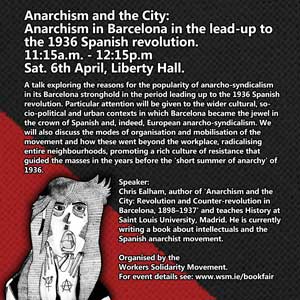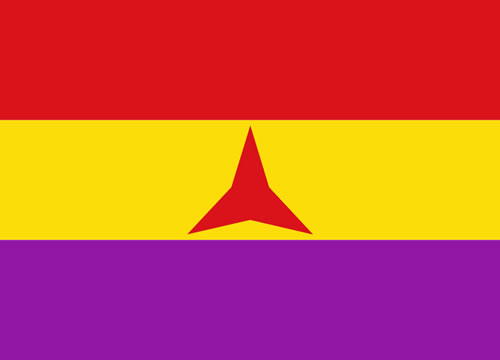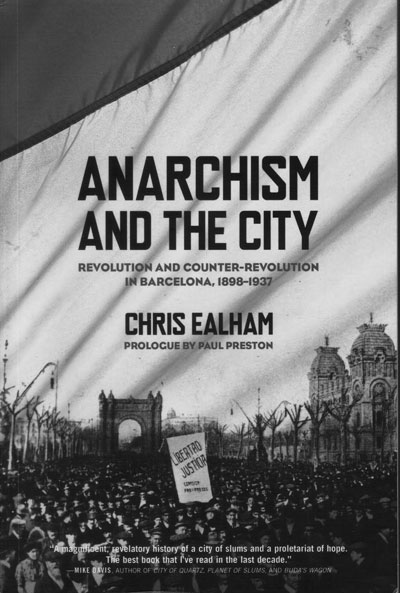Over 30 years of anarchist writing from Ireland listed under hundreds of topics
Spanish revolution
Anarchism and the City - Revolutionary Barcelona in the lead up to the 1936 revolution audio
 Anarchism in Barcelona in the lead-up to the 1936 Spanish revolution. This is the audio and video of the talk given at the 2013 Dublin anarchist bookfair by Chris Ealham (author of 'Anarchism and the City: Revolution and Counter-revolution in Barcelona, 1898--1937')
Anarchism in Barcelona in the lead-up to the 1936 Spanish revolution. This is the audio and video of the talk given at the 2013 Dublin anarchist bookfair by Chris Ealham (author of 'Anarchism and the City: Revolution and Counter-revolution in Barcelona, 1898--1937')
Frank Conroy Commemoration upcoming in Kildare town

A commemoration of Frank Conroy will take place in Kildare town on Sunday December 16th 2012. Frank Conroy came from Fair Green, Kildare town and was an IRA activist who fought with the working class against the fascist Blue Shirts in Kildare and Dublin during the 1930s. Like many Republicans he joined the Republican Congress and Communist Party. Conroy volunteered to fight with Republican leader Frank Ryan in the International Brigade to defend the Spanish Republic against Franco. Organisations attending the commemoration include Eirigi, Workers Party, Workers Solidarity Movement, Tus Nua, the Communist Party and Anti Fascist Action. Main speaker at the event will be Harry Owens.
The Spanish revolution and its relevance today
This year marks the 76 anniversary of the ‘Spanish Civil War’ which is one of the most mis-understood conflicts in the 20th century. For some particular those wedded to a traditional view of history the war was merely between the forces of fascism and those committed to defending the democratically elected Republican Government. It is also this time of year when we will be greeted with a range of lectures and talks organised by the Communist Party inspired International Brigades Commemoration Committee across Ireland which deliberately distorts the reality of the 'civil war'. However, for anarchists nothing could be further from the truth. The social revolutionary upheaval was not just a battle against fascism but a new society in the making-libertarian communism.
Revolution & Counter Revolution in Barcelona
 Seventy-five years ago, in Barcelona and across much of the rest of Spain, anarchists and other radical workers, in order to stop Franco’s attempted coup, stormed army barracks, took over the factories and kicked off “the greatest revolutionary festival in the history of contemporary Europe.”(p.173). A familiar story no doubt, however, unlike many ostensible working class histories of the period, that are often just histories of workers’ organisations, Ealham’s engaging writing and theoretical fluency give us a complete view of proletarian life, from community centres in the city’s slums, to unemployed groups of shoplifters, to general strikes and uprisings.
Seventy-five years ago, in Barcelona and across much of the rest of Spain, anarchists and other radical workers, in order to stop Franco’s attempted coup, stormed army barracks, took over the factories and kicked off “the greatest revolutionary festival in the history of contemporary Europe.”(p.173). A familiar story no doubt, however, unlike many ostensible working class histories of the period, that are often just histories of workers’ organisations, Ealham’s engaging writing and theoretical fluency give us a complete view of proletarian life, from community centres in the city’s slums, to unemployed groups of shoplifters, to general strikes and uprisings.
Shankill commemorates International Brigade volunteers from Northern Ireland
The Shankill library in Belfast hosted a successful meeting as part of the West Belfast Feile on the lives and contributions of working class people from the Falls and Shankill who fought against Fascism 75 years ago in the Spanish Civil War.
It is a living testimony to common class conflict coming to the fore, an often ignored part of our history which does not fit in with the narrative of a divided and segregated sectarian carve up which is the new era in the North.
Friends of Durruti - a balance sheet
WHAT WE THINK
To the activist who strives to contribute to the birth of an authentic memory of the anti-authoritarian current of the workers' movement, the question is posed thus: what is the contribution of the historic episode that was the acts and ideas of the Friends of Durruti? Therefore to complete this study, we must draw up a balance-sheet, to assess in some way their achievements and failures.
The 'Friends of Durruti' and the 'People's friend' - part 1
WHO WERE THE FRIENDS OF DURRUTI
We saw, in part one, that opposition began to show itself against the lawyers who were, to a greater or lesser extent, accustomed to ministerial collaboration. Notably the Catalan Libertarian youth had declared their refusal to "become accomplices by staying silent" and they had even added "we are ready to return to illegal existence if necessary..."
The bourgeois republic and the revolutionaries
THE REPUBLIC OF 14 APRIL 1931
The anti-fascist camp in the Spanish revolution
It is absolutely necessary - the Friends of Durruti tried to point out - to find a path which allows revolutionaries, without compromising and without falling into an unprincipled anti-fascist front, to have a practical strategy of struggle which unifies the proletarian forces against the violent blows of the reaction, militarism and fascism. One understands why the Friends of Durruti, should have given such importance to the so-called choice 'war or revolution'
But, before addressing the events and their analysis, we must lay out, as briefly as possible, the composition of the forces present on the "antifascist" side, in order to assist the journey of the non expert reader across what one author has called the "Spanish Labyrinth". The bibliography which we give will allow one to find fuller information.
The Spanish Civil War - Rebellion and Resistance - Chapter 1
In the 1930's Europe was experiencing one of its' worst ever slumps. The Wall Street crash came in 1929 and its repercussions were felt far and wide. Spain was no exceptionBy 1936 unemployment had gone over 30% in many of the towns and cities Out of a total workforce of three million, one million were out of work. There was no dole and as prices rose by 80% in the five years up to 1936, many encountered severe hardship.

